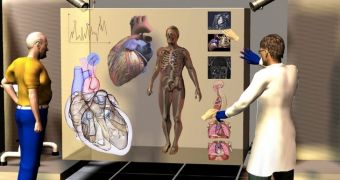Brainiacs with the University of Sheffield in the United Kingdom and fellow researchers are now working on a project that they say has the potential to forever transform modern medicine and the practice of testing various new drugs and treatment options.
The project in question boils down to the development of a so-called Virtual Physiological Human that scientists say could serve to investigate the effect of drugs and treatments both faster and at a lower cost than current methods.
Besides, the project could make it possible to develop better personalized care options for people diagnosed with various health problems, Live Science informs.
The same source tells us that this Virtual Physiological Human is basically a computer-generated replica of the human body. Simply put, it is a virtual human body that specialists could toy with as they see fit.
The project is still ongoing, and scientists with the University of Sheffield and their colleagues explain that the goal is to create a virtual human body whose mechanical, physical, and biochemical functions are the same as the ones documented in real patients.
Should this project prove successful, the resulting Virtual Physiological Human could help researchers gain a better understanding of medical conditions such as lung disease, heart and circulatory system defects, even Parkinson's disease.

 14 DAY TRIAL //
14 DAY TRIAL //